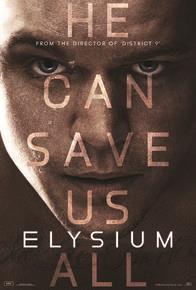
CLIP: The clip starts at the very beginning of the film and lasts until 4 minutes exactly, although if you have time, watch until 7 minutes and 3 seconds and you will have a lot more examples of inequality in this world.
In the film, two classes of people exist: the wealthy, who live on a luxurious space station called Elysium (having abandoned the ravaged Earth), and the poor, who live on an overpopulated, devastated Earth. Life is hard for those left behind who find themselves ruthlessly policed and watched over by robots. In contrast, those on Elysium have robot butlers and use bed-shaped medical bays to keep them free of all disease and illness. Former car thief Max Da Costa (Matt Damon) lives on Earth, but after an exposure to a lethal dose of radiation, he has only five days to live. Max decides to try to make the illegal trip to Elysium in order to find a cure, but what starts off as a potentially selfish act quickly becomes something more. Elysium’s Secretary of Defence, Delacourt (Jodie Foster), and a rather mean agent, Kruger (Sharlto Copley), try everything in their power to stop him.
The clip that we are looking at in this session takes place at the very beginning of the film. Giving some context to the story, this clip shows Max at a younger age, and we see the world through his eyes. It also shows the difference in life quality between those on Earth and those on Elysium, and immediately raises the question - would you want to live forever on Elysium or live a more ‘real’ life on Earth? After showing the clip as a stimulus, break into small discussion groups and explore the following questions:
• Is it always wrong for some people to have more material possessions than others?
• Are there any examples of inequality in your community?
• Have you ever felt discriminated against?
• Should people feel guilty for having a better quality of life compared to other people? After discussing the first set of questions, read through James 2:1-12 together, (you may wish to give some context to this passage) and return to your groups to discuss the final set of questions:
• What does this verse appear to be saying about equality and injustice?
• What are the implications of verses 1-4 if you are a Christian?
• Do we have a responsibility as Christians to use our wealth in a certain way?
• If we were to apply this to our lives, what might happen?











































